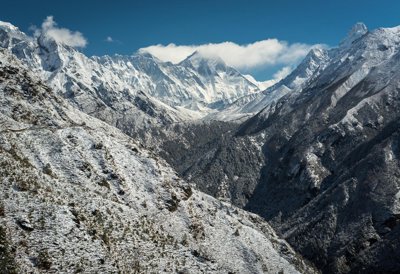How did you get to where you are now?
I got to be a principal scientist because I pursued a subject I really enjoyed, one that has fascinated me for my whole life; and I say ‘yes’ when opportunities to learn something new – or do something new – turn up.
I had an excellent geography teacher who inspired me during my GCSEs and A Levels, leading us on field trips to glacial, coastal and riverine landscapes. I did a geography degree at Southampton University, then a PhD in fluvial geomorphology where I investigated how trees and vegetation affect river evolution. At the time I had no idea what job I might find in future, but I enjoyed what I was doing.
Saying yes to an opportunity turned out to be the catalyst that started my professional career. A PhD student needed someone to help with topographic surveying. I volunteered and in return learned how to use the survey kit. I was then asked by the university’s small consultancy team to survey a river restoration site - my first professional job. This led to more part time work surveying rivers, digitizing maps and analysing data while I completed my PhD. I also organised workshops, taught people about rivers and led field trips too.
When I finished my PhD I was not sure what to do but didn’t feel ready to go for a lectureship or be a researcher. I found a job as a fieldwork demonstrator, supporting geographic research and teaching at Bournemouth University. I learned how to use laser scanners and geophysics equipment and applied these techniques to assess contaminated land. This led to a job as an environmental scientist at a consultancy firm, working on EIA’s and river projects. I then moved to Scotland and spent ten years working as a geomorphologist at SEPA, advising on river geomorphology and river restoration.
I then moved to the Environment Agency for a principal scientist post in the national geomorphology team. I am also a voluntary Director at the British Society for Geomorphology, where I chair the BSG’s newest committee that works for applied professional geomorphologists.
Was there anything particularly useful that helped you get into this role?
Saying yes to new experiences and challenges has given me skills and experiences that created my career - and I’ve also been lucky. It was by chance that I studied at a geography department that applied the science and that my supervisor turned out to be a leading light in applying the science. My skills coincided with need. As I started my professional career, new legislation had just been published to protect water environments. This created a demand for geomorphologists just when I was finishing my studies and gave me the chance to develop a career.
What do you do as part of your role?
I spend time visiting rivers, surveying their forms and features to understand what they are like now, and how they might be restored. Recently I have been reviewing geomorphology technical assessments for a hydro power project to check the environmental impact is ok. I also analyse LIDAR data in ArcGIS and run models to check the impact. Alongside this I organise workshops and training to share geomorphological skills and knowledge, attend team meetings to plan future work and meet with other academics to discuss new ways to monitor the environment.
What skills and characteristics do you need for this role, apart from geographical knowledge?
Clear communication is very important. Not many people know what geomorphology is in the first place, and it can be hard to explain core ideas to others and why it matters that rivers evolve over decades or centuries.
How does geography feature in your work/what difference does it make?
An understanding of how people and the environment interact is at the heart of what I do. Without geographical knowledge and training I could not do my job.
What advice would you give to someone wanting to go in to this career?
Be open to opportunity. I studied geography but I didn’t know I’d become a geomorphologist. If you are interested in a career in geomorphology in particular, here is some advice:
If you’re at school and thinking of going to university, then you should apply to geography departments that focus on geomorphology and on application of geomorphology to solve real world problems.
If you are an undergraduate then look for a dissertation where you apply your academic knowledge to a real world geomorphological issue or problem. For graduates who might be interested in postgraduate study, look for a masters or a PhD where you can investigate an applied geomorphology issue, ideally while working with an external organisation that is involved in an existing project already.
Join the British Society for Geomorphology – it’s good value, especially for students, and gives you access to useful information and networks.
Why did you choose geography? Why should others choose geography?
You should choose geography because it matters in a globally-connected world. It matters now, and it will matter even more into the future when society will need your geographic skills to manage major environmental issues. Studying geography will give you a broad range of opportunities to do something interesting in life and you’ll very likely get the best field trips too. It’s interesting, fulfilling, and useful.
Dr Richard Jeffries
Job title: Principal Geomorphologist
Organisation: Environment Agency
Location: Across England

